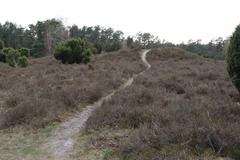Visiting Hours, Tickets, and Historical Sites: Comprehensive Guide to Visiting Eckernworth, Walsrode, Germany
Date: 01/08/2024
Introduction
Eckernworth forest, often referred to as the ‘Green Lung’ of Walsrode, Germany, is a remarkable blend of natural beauty and historical significance. This urban oasis offers visitors a serene escape from the bustle of modern life, with its expansive 50 hectares of lush greenery and ancient trees, some of which are over 300 years old. The forest’s historical roots date back to the early 1600s, as documented by Dr. Johann Mellinger, a court physician from Celle, in his ‘Ämteratlas des Fürstentums Lüneburg’ (Lüneburger Heide). Eckernworth’s cultural tapestry is further enriched by Hermann Löns, a renowned poet and journalist who found inspiration in its tranquil surroundings. This comprehensive guide aims to provide all the necessary information for potential visitors, including visiting hours, ticket prices, travel tips, and nearby attractions, ensuring a memorable experience in this historic and natural gem of Walsrode.
Table of Contents
- Introduction
- Historical Background
- The Green Lung of Walsrode
- Visitor Information
- Modern-Day Significance
- Cultural Impact
- Seasonal Highlights
- FAQ
- Conclusion
Historical Background
Early Mentions and Development
The historical significance of the Eckernworth forest area dates back several centuries. The first notable mention of this region can be traced to the early 1600s when Dr. Johann Mellinger, a court physician from Celle, included Eckernworth in his ‘Ämteratlas des Fürstentums Lüneburg’ (Lüneburger Heide). This early documentation highlights the area’s longstanding importance as a natural and recreational space.
The Role of Hermann Löns
Hermann Löns, a renowned poet and journalist who lived between 1866 and 1914, frequently visited the ‘Waldwirtschaft,’ a local forest inn, and considered Eckernworth one of his favorite places. His literary works often reflect the natural beauty and tranquility of the area, contributing to its cultural and historical significance (Lüneburger Heide).
The Green Lung of Walsrode
Conservation Efforts
Over the years, various conservation efforts have been implemented to preserve the natural beauty and ecological balance of Eckernworth. These initiatives aim to protect the ancient trees, maintain the cleanliness of the walking trails, and ensure the well-being of the local wildlife. The area’s status as a popular recreational spot has necessitated these measures to balance human activity with environmental preservation (Lüneburger Heide).
Visitor Information
Visiting Hours and Tickets
Eckernworth is open year-round. Visiting hours typically start from dawn and continue until dusk. Admission to the forest is free, but certain activities or guided tours might have associated costs. It’s advisable to check the local tourism website or contact the Walsrode tourist information center for the most current details on visiting hours and ticket prices.
Travel Tips and Accessibility
For those planning to visit Eckernworth, several practical tips can enhance the experience. The forest is easily accessible from the city center of Walsrode, and ample parking is available near the main entrance. The Waldgaststätte Eckernworth, a local restaurant, offers regional cuisine at affordable prices and is a great spot to relax after a day of exploring (Komoot). The area is family-friendly, with playgrounds and picnic spots scattered throughout the forest.
Nearby Attractions
While in Walsrode, visitors can also explore other historical sites and attractions, such as the Walsrode Abbey and the Weltvogelpark Walsrode, one of the largest bird parks in the world. These nearby attractions add to the appeal of visiting Eckernworth and provide a well-rounded cultural experience.
Modern-Day Significance
Today, Eckernworth continues to be a beloved destination for both locals and tourists. The forest offers a variety of activities, including hiking, bird-watching, and picnicking. Several well-marked trails guide visitors through scenic spots such as the Jungbrunnen, Bohlenbachtal, and the Mond- und Sonnenscheinbrücke (Lüneburger Heide). These trails not only provide recreational opportunities but also serve as a living museum of the area’s rich history.
Cultural Impact
The cultural impact of Eckernworth extends beyond its natural beauty. The forest has inspired numerous artists, writers, and poets over the years. Hermann Löns is perhaps the most famous of these, but many others have also found inspiration in the tranquil surroundings. This cultural heritage adds another layer of significance to the area, making it a multifaceted destination that appeals to a wide range of interests (Lüneburger Heide).
Seasonal Highlights
Eckernworth is a year-round destination, but each season offers unique experiences. In spring, the forest comes alive with blooming flowers and fresh greenery. Summer is ideal for picnics and long hikes, while autumn transforms the landscape into a tapestry of vibrant colors. Winter, though quieter, provides a serene and peaceful atmosphere, perfect for reflective walks and bird-watching (Lüneburger Heide).
FAQs
What are the visiting hours for Eckernworth?
Eckernworth is open from dawn until dusk. It’s best to check the local tourism website for the most accurate information.
Are there guided tours available at Eckernworth?
Yes, guided tours are available and can be arranged through the Walsrode tourist information center or local tour operators.
What are the ticket prices for Eckernworth?
Entry to Eckernworth is free. However, certain activities or guided tours may have associated costs. It is best to inquire at the Tourist Information Center for detailed information.
Conclusion
Eckernworth forest stands as a testament to the harmonious coexistence of nature and history. Its rich heritage, documented as far back as the early 17th century, combined with its lush, biodiverse environment, makes it a must-visit destination for both nature enthusiasts and history buffs. The forest’s role as the ‘Green Lung’ of Walsrode underscores its importance in providing a natural respite within an urban setting. Whether you’re hiking through its scenic trails, exploring its historical landmarks, or simply soaking in the serene atmosphere, Eckernworth offers a unique and enriching experience. The ongoing conservation efforts ensure that this natural haven remains preserved for future generations, continuing to inspire and provide solace. For those planning a visit, Eckernworth promises a blend of cultural heritage, natural beauty, and recreational opportunities, making it a perfect getaway in the heart of Walsrode (Lüneburger Heide).
References
- Erlebniswelt Lüneburger Heide, 2024, Erlebniswelt Lüneburger Heide (https://www.erlebniswelt-lueneburger-heide.de/detail/id=5ff84d79b4dc7458417f9a7d)
- Komoot, 2024, Komoot (https://www.komoot.com/de-de/highlight/859462)
- Lüneburger Heide, 2024, Lüneburger Heide (https://www.lueneburger-heide.de/natur/sehenswuerdigkeit/21985/walsrode-waldgebiet-eckernworth.html)
- Nomad Footsteps, 2024, Nomad Footsteps (https://nomadfootsteps.com/best-time-to-visit-germany/)
- Outdooractive, 2024, Outdooractive (https://www.outdooractive.com/en/travel-guide/germany/walsrode/802543560/)
- Travellers Worldwide, 2024, Travellers Worldwide (https://travellersworldwide.com/best-time-to-visit-germany/)
- Wikipedia, 2024, Wikipedia (https://de.wikipedia.org/wiki/Eckernworth)

